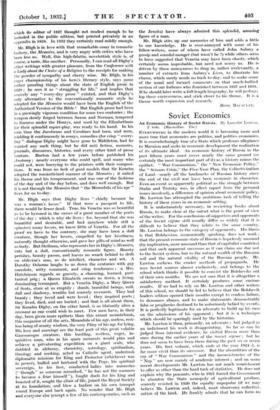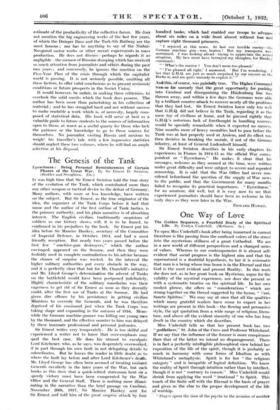Soviet Economics
EVERYWHERE in the modern world it is becoming more and more true that economics are politics, and politics economics.
It is overwhelmingly true of a State which professes allegiance to Marxism and seeks in economic development the realization of its ultimate ideal. An economic history of Russia in the past fifteen years must cover nearly the same ground (or certainly the most important part of it) as a history minus the , epithet. " War Communism," the " New Economic Policy," the " Scissors Crisis," the Five-Year Plan, the Collectivization of Land—nearly all the landmarks of Russian history since the end of the civil war have been economic in character. Even an event so apparently political as the struggle between Stalin and Trotsky was, in effect (apart from the personal issues involved), a difference of opinion about economic policy. Mr. Lawton has attempted the ambitious task of telling the history of these years in an economic setting.
It is unfortunately necessary, in reviewing books about Russia, to make clear at the outset what is the point of view of the writer. For the conclusions of supporters and opponent; of the Soviet regime still usually differ so widely that it is difficult to believe that they relate to the same country. Mr. Lawton belongs to the category of opponents. His thesis is that Bolshevism, economically speaking, does not work ; that the present economic state of Russia is hopelessly unsound (by implication, more unsound than that of capitalist countries) and that such apparent successes as it can claim are due not to the Soviet system, but to the natural wealth of the Russian soil and the natural vitality of the Russian people. Mr. Lawton eschews the cruder methods of propaganda. He uses Soviet sources almost exclusively, and belongs to the school which thinks it possible to convict the Bolsheviks out of their own months. We are not sure that it is altogether a satisfactory method. It certainly produces some curious results. If we had to rely on Mr. Lawton and other writers of this school, we should be led to believe that the Bolshevik leaders'seldom opened their mouths except to confess failure, to denounce abuses, and to make statements demonstrably false or prophecies destined to be notoriously belied by events. It is perfectly legitimate for an advocate to build up his ease on the admissions of his opponent ; but it is a technique which should be sparingly used by the historian.
Mr. Lawton is then, primarily, an advocate ; but judged as an indictment his work is disappointing. So far as can be judged from internal evidence, he visited Russia more than once 'during the earlier years of the Soviet regime ; but he does not seem to have been there during the past six or seven years. His first volume, which ends at the year 1924-5, is far more vivid than its successor. But the absurdities of the era of " War Communism " and the inconsistencies of' the " Nep " are now mainly of academic interest ; and on more recent developments Mr. Lawton has not much nourishment to. offer us other than the hard tack of statistics. He does not explain why the peasants, who in 1921 forced the Government to abandon the State monopoly of agricultural produce, scarcely resisted in 1930 the equally unpopular, (if we may believe Mr. Lawton and, indeed, most observers) collectivi- zation of the land. He frankly admits that he can form no estimate of the ProduCtivity of the collective farms. He does not mention the big engineering Works of the last few yeara; of which the Dnieper Dani and- the Tufk-Sib" Railway are the most fanious ;. nor has he anything to say of the Nizhni-: Novgorod- motor works or other recent experinients in mass: prodifetion. He does not diSCUSS—perhaps he regards "it as- negligible—the menace of Russian dumping which has received so hutch attention from jotirnalists and otheiS during the past' two years ; and conversely, he ignores the reaction 'on the Five-Year Plan of the Crisis- through Which the ca:pitalist world is paising: It is not se. rionsly possible, -omitting all' these factor's, to offer 'Valid conclusions as to'Present economic' conditions oefuture prospects in the Soviet Union-.
It would hoWever, be unfair, in making these criticisms, td- overlook the solid merits which the book does possess. The author has been more than painstaking in his collection of material ; and.he has struggled hard and not without success to make readable a work which is, of necessity, largely com- posed of statistical data. His book will serve at best as a valuable guide to future students to the sources of information open to them, at worst as a useful qtiarry for those who lack the patience or the. knowledge to go to those sources for themselves. No journalist visiting Russia and anxious to weight his traveller's tale with a few impressive statistics should neglect these two volumes, where he will find an ample selection at his disposal.















































 Previous page
Previous page